WASHINGTON, D.C. -- Although the image of U.S. leadership is showing some cracks in the third year of President Barack Obama's presidency, it remains more positive worldwide than during the last years of the Bush administration. Across 136 countries, median approval of U.S. leadership in 2011 stood at 46% -- relatively unchanged from the 47% median across 116 countries in 2010.
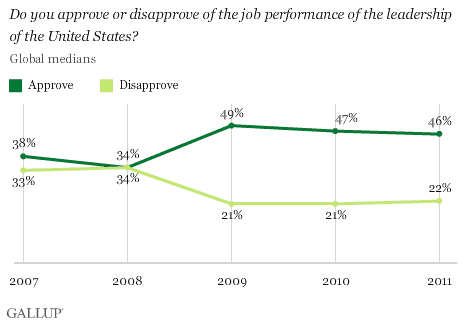
Yet, U.S. leadership ratings in 2011 failed to regain the momentum they lost in 2010, and instead remained static or retreated even more in some places. Gallup surveyed more countries in 2011 than in 2010, but looking at approval in just the countries surveyed in both 2010 and 2011, the median is slightly lower at 43%, suggesting the U.S. has lost some of its status.
Approval Declines in Africa, Where U.S. Leadership Gets Its Highest Marks
A closer look at where U.S. leadership stands at the regional and country levels reveals specific areas of strength and weakness. The image of U.S. leadership continued to be the strongest worldwide in Africa in 2011, bolstered by strong majority approval in sub-Saharan Africa. However, this strong support in the subcontinent is showing signs of weakening for the first time during the Obama administration. After two consecutive years of approval in the mid-80s, support across Africa dropped to a median of 74% in 2011.
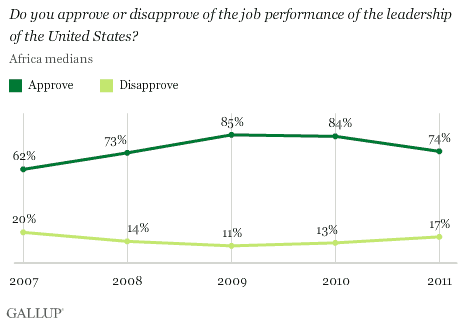
Double-digit losses in 10 sub-Saharan countries, including an 18-percentage point drop in South Africa, led the declines that essentially negate the gains after the transition from the Bush to the Obama administration. Still, at least two-thirds of residents in 33 sub-Saharan African countries surveyed said they approve of the job performance of the leadership of the U.S.
U.S. leadership remains far less popular in North Africa. No approval rating tops 40% there. Interestingly, ratings in North Africa after the Arab Spring are not any worse or any better in most countries except Tunisia and Morocco, where ratings were somewhat higher.
U.S. Image Sinks in the Americas
U.S. approval initially surged in the Americas when Obama took office, but it has been falling since. Although declines have not completely erased gains, the trend is moving in that direction. Median approval dropped to 40% in 2011 from 46% in 2010.
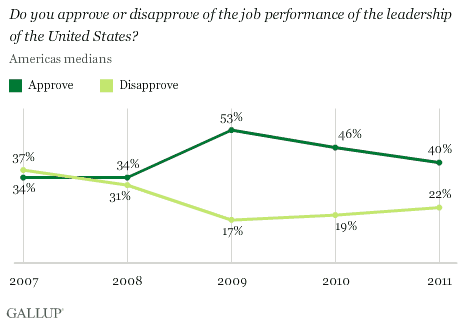
Approval fell significantly for the second consecutive year in many of the Latin American and Caribbean countries surveyed. There were notable double-digit losses in several key countries, including Colombia and Panama, which inked long-delayed trade deals with the U.S. in 2011.
In countries such as Mexico, where approval declined 14 points, losses did not necessarily mean higher disapproval. More Mexicans in 2011 were uncertain about the leadership of their northern neighbor, with 42% saying they did not have an opinion. In Chile and Panama, however, disapproval rose almost as much as approval declined.
Approval Sees Ups and Downs in Europe
Median approval in Europe is still more than twice as high in 2011 as it was during the last years of the Bush administration, but the trend is moving in a negative direction. A median of 42% across 37 countries surveyed approved of U.S. leadership last year, down from the peak of 47% in 2009.
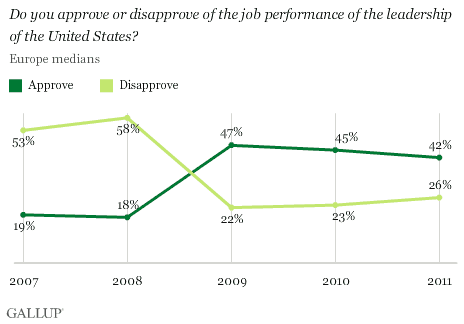
Approval increased by double digits in the United Kingdom and Belgium in 2011. The U.S. also retained majority support in eight countries in 2011 that span several regions: Kosovo, Albania, Ireland, the United Kingdom, the Netherlands, Macedonia, Hungary, and Lithuania.
However, U.S. leadership lost favor among other longtime allies, with double-digit declines in countries such as France, Germany, Spain, and Sweden. In France and Spain, approval fell below the majority level. Ratings did not change significantly in about half of the 37 countries Gallup surveyed, which could be a positive indicator given the declines in leading nations and the volatility of the economic situation gripping Europe and the U.S.
Approval in Asia Steady
As the Obama administration shifted its foreign policy focus to Asia in 2011, Gallup's surveys found approval in the region remained generally stable between 2010 and 2011. The 39% median approval in 2011 was still higher than any rating during the Bush administration.
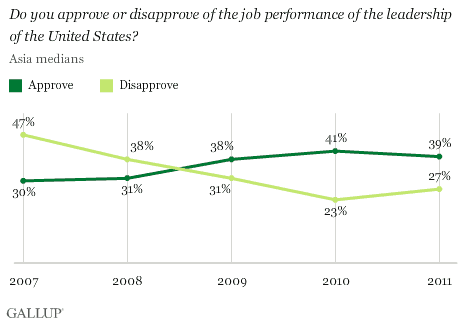
Views of U.S. leadership varied a great deal across Asia in 2011. Ratings in most of the region tended to be more positive than negative, except for the Middle East and parts of South Asia, where residents were still more likely to disapprove than approve.
One of the challenges of increasing U.S. engagement with Asia, particularly in the Asia-Pacific region, is that the U.S. continues to have visibility issues with residents. Despite Obama's multiple visits to the region during the first three years of his presidency, sizable proportions still do not have an opinion of U.S. leadership.
More Big Losses in 2011, Few Big Gains
The list of countries where approval of U.S. leadership dropped substantially --10 points or more -- in 2011 is nearly twice as long as the list in 2010. The list represents every major global region and includes major nations and longtime U.S. allies. U.S. leadership approval made substantial gains in three countries in 2011: Belgium, the United Kingdom, and Cambodia.
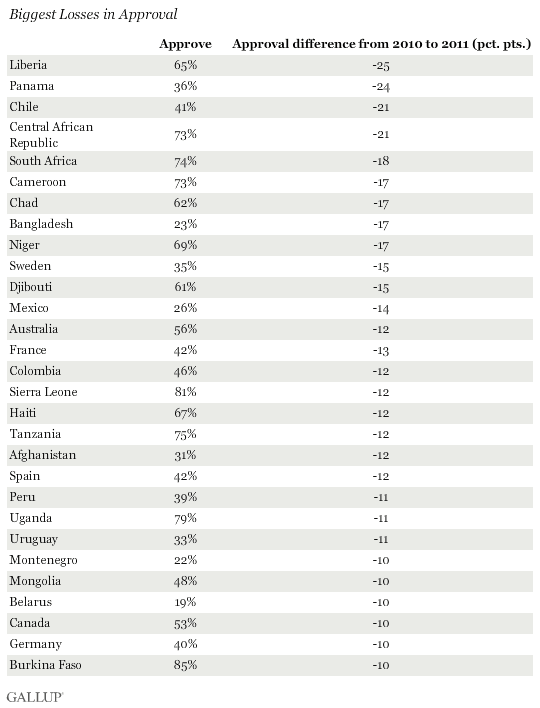
Implications
As the U.S. attempts to build engagement around the world, it does so already well-positioned with the public in many parts of it. At the same time, the U.S. cannot take any of this support for granted. Gallup data show that approval waned after the initial euphoria after Obama's election wore off -- even among some of the biggest fans of the country's leadership. Bolstering the U.S. image worldwide will likely be a challenge for the next president regardless of who that will be.
Read the complete findings from the U.S.-Global Leadership Project.
For complete data sets or custom research from the more than 150 countries Gallup continually surveys, please contact SocialandEconomicAnalysis@gallup.com or call 202.715.3030.
Survey Methods
Results are based on face-to-face and telephone interviews with approximately 1,000 adults, aged 15 and older, conducted throughout 2010 in 116 countries and 2011 in 136 countries. Questions about national leadership could not be asked in several countries in compliance with local regulations. In Algeria, Comoros, Egypt, Iraq, Lebanon, Mauritania, Morocco, Palestinian Territories, Somaliland region, Tunisia, and Yemen, measures are aggregated based on multiple surveys conducted in 2010 and 2011. For results based on the total samples, one can say with 95% confidence that the maximum margin of sampling error ranges from ±1.7 percentage points to ±5.7 percentage points. The margin of error reflects the influence of data weighting. In addition to sampling error, question wording and practical difficulties in conducting surveys can introduce error or bias into the findings of public opinion polls.
With some exceptions, all samples are probability based and nationally representative of the resident population aged 15 and older. Exceptions include areas where the safety of interviewing staff is threatened, scarcely populated islands in some countries, and areas that interviewers can reach only by foot, animal, or small boat.
For more complete methodology and specific survey dates, please review Gallup's Country Data Set details.

